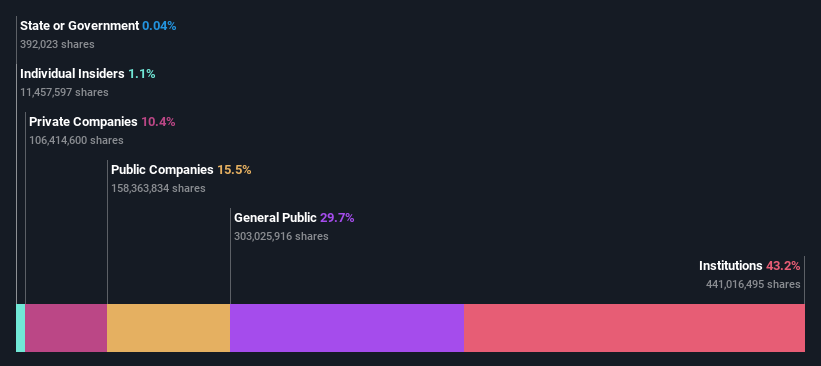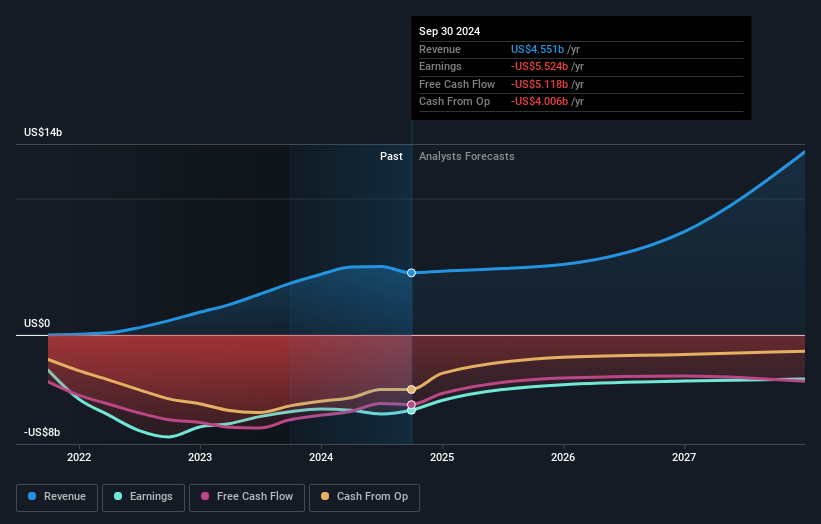- United States
- /
- Auto
- /
- NasdaqGS:RIVN
After losing 14% in the past year, Rivian Automotive, Inc. (NASDAQ:RIVN) institutional owners must be relieved by the recent gain

Key Insights
- Significantly high institutional ownership implies Rivian Automotive's stock price is sensitive to their trading actions
- The top 9 shareholders own 51% of the company
- Ownership research along with analyst forecasts data help provide a good understanding of opportunities in a stock
A look at the shareholders of Rivian Automotive, Inc. (NASDAQ:RIVN) can tell us which group is most powerful. The group holding the most number of shares in the company, around 43% to be precise, is institutions. In other words, the group stands to gain the most (or lose the most) from their investment into the company.
Institutional investors would appreciate the 8.0% increase in share price last week, given their one-year losses have totalled a disappointing 14%.
Let's take a closer look to see what the different types of shareholders can tell us about Rivian Automotive.
Check out our latest analysis for Rivian Automotive

What Does The Institutional Ownership Tell Us About Rivian Automotive?
Institutions typically measure themselves against a benchmark when reporting to their own investors, so they often become more enthusiastic about a stock once it's included in a major index. We would expect most companies to have some institutions on the register, especially if they are growing.
Rivian Automotive already has institutions on the share registry. Indeed, they own a respectable stake in the company. This can indicate that the company has a certain degree of credibility in the investment community. However, it is best to be wary of relying on the supposed validation that comes with institutional investors. They too, get it wrong sometimes. If multiple institutions change their view on a stock at the same time, you could see the share price drop fast. It's therefore worth looking at Rivian Automotive's earnings history below. Of course, the future is what really matters.

Rivian Automotive is not owned by hedge funds. Our data shows that Amazon.com, Inc. is the largest shareholder with 16% of shares outstanding. Meanwhile, the second and third largest shareholders, hold 10% and 7.0%, of the shares outstanding, respectively. Additionally, the company's CEO Robert Scaringe directly holds 1.1% of the total shares outstanding.
On further inspection, we found that more than half the company's shares are owned by the top 9 shareholders, suggesting that the interests of the larger shareholders are balanced out to an extent by the smaller ones.
Researching institutional ownership is a good way to gauge and filter a stock's expected performance. The same can be achieved by studying analyst sentiments. There are plenty of analysts covering the stock, so it might be worth seeing what they are forecasting, too.
Insider Ownership Of Rivian Automotive
The definition of an insider can differ slightly between different countries, but members of the board of directors always count. The company management answer to the board and the latter should represent the interests of shareholders. Notably, sometimes top-level managers are on the board themselves.
I generally consider insider ownership to be a good thing. However, on some occasions it makes it more difficult for other shareholders to hold the board accountable for decisions.
We can see that insiders own shares in Rivian Automotive, Inc.. The insiders have a meaningful stake worth US$161m. Most would say this shows a good alignment of interests between shareholders and the board. Still, it might be worth checking if those insiders have been selling.
General Public Ownership
The general public, who are usually individual investors, hold a 30% stake in Rivian Automotive. While this size of ownership may not be enough to sway a policy decision in their favour, they can still make a collective impact on company policies.
Private Company Ownership
It seems that Private Companies own 10%, of the Rivian Automotive stock. It's hard to draw any conclusions from this fact alone, so its worth looking into who owns those private companies. Sometimes insiders or other related parties have an interest in shares in a public company through a separate private company.
Public Company Ownership
Public companies currently own 16% of Rivian Automotive stock. This may be a strategic interest and the two companies may have related business interests. It could be that they have de-merged. This holding is probably worth investigating further.
Next Steps:
I find it very interesting to look at who exactly owns a company. But to truly gain insight, we need to consider other information, too. Take risks for example - Rivian Automotive has 2 warning signs we think you should be aware of.
Ultimately the future is most important. You can access this free report on analyst forecasts for the company.
NB: Figures in this article are calculated using data from the last twelve months, which refer to the 12-month period ending on the last date of the month the financial statement is dated. This may not be consistent with full year annual report figures.
New: AI Stock Screener & Alerts
Our new AI Stock Screener scans the market every day to uncover opportunities.
• Dividend Powerhouses (3%+ Yield)
• Undervalued Small Caps with Insider Buying
• High growth Tech and AI Companies
Or build your own from over 50 metrics.
Have feedback on this article? Concerned about the content? Get in touch with us directly. Alternatively, email editorial-team (at) simplywallst.com.
This article by Simply Wall St is general in nature. We provide commentary based on historical data and analyst forecasts only using an unbiased methodology and our articles are not intended to be financial advice. It does not constitute a recommendation to buy or sell any stock, and does not take account of your objectives, or your financial situation. We aim to bring you long-term focused analysis driven by fundamental data. Note that our analysis may not factor in the latest price-sensitive company announcements or qualitative material. Simply Wall St has no position in any stocks mentioned.
About NasdaqGS:RIVN
Rivian Automotive
Designs, develops, manufactures, and sells electric vehicles and accessories.
Excellent balance sheet with limited growth.
Similar Companies
Market Insights
Community Narratives



